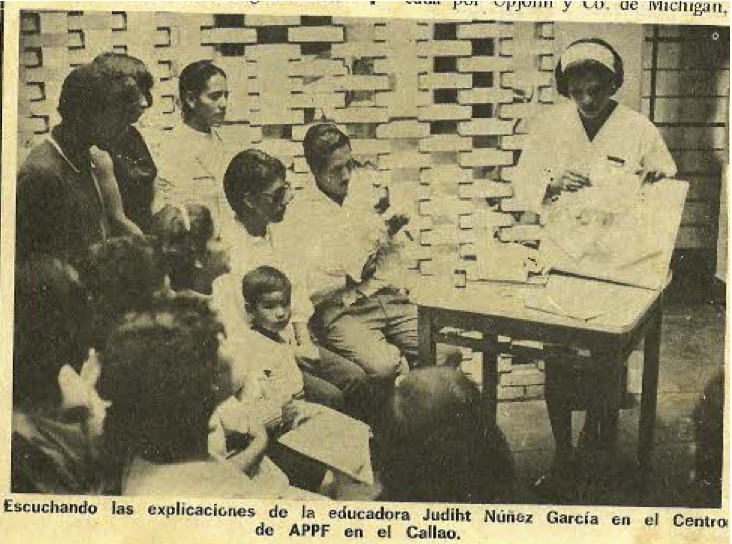It was our good fortune to share a table with three terrific scholars at the 2015 American Historical Association (AHA) conference, all working in the borderlands of reproduction, sexuality, health, and Latin American/Caribbean politics. Our panel, “The Politics of Reproduction in the Americas: Bolivia, Jamaica, and Cuba,” starred Darcy Hughes Heuring, Rachel Hynson, and Tasha Kimball. Cassia organized and moderated the panel, and Raúl commented. The field feels a tad bigger every year, and similar historian-led panels have taken place at the Latin American Studies Association (LASA) in Montreal, Rio de Janeiro, and San Francisco, and that of the Social Science History Association (SSHA) in Chicago, for example.
This time around in New York City, our panel came together to reflect on how the politics of nationalism related to public debates about contraception in the mid-twentieth century, an issue that connects the enduringly controversial status of family planning to broader social phenomena. Nothing about Latin American birth control nowadays can be fully comprehended without addressing its historical links with longstanding political forces in both individual countries and the region as a whole. From heated debates surrounding access to contraception in the United States to recent abortion-related deaths and arrests in El Salvador, Brazil, and Chile, recent events have thrust the political implications of reproductive health into the mainstream. The panel demonstrated that historians play an integral role in uncovering and understanding the long and uneven trajectory of women’s health and access to contraception and abortion in the region. As the papers demonstrate, the politicization of women’s bodies is anything but new, and to understand current manifestations, we must look to the past.

Heuring’s paper explored political debates over birth control in 1930s and 1940s Jamaica. Heuring staked out the positions of major parties and explained that birth control stood in for notions of citizenship and nationalism and “played an important role in…political developments in that it was made to stand in for two divergent and divisive notions of what it meant to be Jamaican and whose interests the ‘new’ Jamaica would serve.” The nationalist, middle-class People’s National Party portrayed birth control as a necessary civilizing force, reinforcing “British cultural values of diligence, propriety, and self-restraint” in the country. In contrast, the Jamaica Labour Party, the island’s first working-class political party, viewed birth control as an unwanted foreign notion pushed by clueless or mischievous local elites. It was surprising and fascinating to learn how visible and divisive the issue of contraception was for the nationalist movements that shaped Jamaican party politics prior to independence in 1962, especially considering that family planning elsewhere in Latin America and the Caribbean remained a politically taboo subject until the 1960s.
Hynson’s work focused on Cuban physicians’ positions on contraception between the 1930s and 1960s. Hynson emphasized that US physicians were important contributors to knowledge about contraception throughout this period. Nonetheless, because Cubans viewed foreign interventions as unwelcome and controversial, local medical authorities strived to publicly portray birth control as a tool controlled by Cuban hands, set to address Cuban problems, thus underplaying their debts to US physicians. As Hynson argues, “Cuban physicians utilized information from international family planning organizations…to construct a national policy on birth control that did not correspond with the aims of population control groups.” This framing by Cuban physicians was a significant and labor-intensive accomplishment, and it would be worth probing to what extent other medico-political elites in Latin America engaged in the same kind of public relations gamesmanship to buttress nationalist schemes. In the end, Hynson convincingly suggests we look at Cold War politics in a new light when suggesting “that medical practitioners were better able than politicians to bridge the Cold War divide” between Cuba and the US.
Whereas the previous speakers emphasized the macropolitical, Kimball connected political transformations with women’s intimate decisions about abortion in Bolivia between the 1960s and 1980s. Kimball asked how state policy affected personal experiences. Drawing from the medical records of the Instituto de Maternidad Natalio Aramayo in La Paz, as well as oral histories of Bolivian women, her paper demonstrated that hope, conflict, and fear of stigma, medical risk, and criminal sanction drove decisions to have abortions. Kimball’s paper maintained that “the ways in which women negotiated their sexual and reproductive lives…had more to do with personal factors and with the socioeconomic and cultural context in which women’s lives were lived, than with the government policies or official discourses on sex and reproduction.”
The papers in this panel stand together in acknowledging that sexual and reproductive injustices have old, tangled roots that need a good and public airing out. Moreover, these individual case studies can be connected to others within and without the region. Health, reproduction, and sex can bring us together to debate birth control technologies, abortion, and eugenics, alongside political economy, population policies, and the gendered micro-politics of families and couples forming and breaking apart. Such phenomena have correlates in Africa, China, India, Russia, and Southeast Asia, for example, which can be profitably compared and contrasted with the cases in this AHA panel. Moreover, they can help us understand the uneven access to contraception and abortion in places like the United States and Europe, where the history of reproductive justice is regionally and temporally uneven.
 Raúl Necochea is an Assistant Professor in the Department of Social Medicine and an Adjunct Assistant Professor in the Department of History at the University of North Carolina – Chapel Hill. He is the author of A History of Family Planning in Twentieth Century Peru (2014), published by the University of North Carolina Press.
Raúl Necochea is an Assistant Professor in the Department of Social Medicine and an Adjunct Assistant Professor in the Department of History at the University of North Carolina – Chapel Hill. He is the author of A History of Family Planning in Twentieth Century Peru (2014), published by the University of North Carolina Press.
 Cassia Roth is a PhD Candidate in History at the University of California, Los Angeles. Her research has been supported by the Woodrow Wilson Foundation, the Fulbright IIE, and the National Science Foundation. Her dissertation, entitled “A Miscarriage of Justice: Reproduction, Medicine, and the Law in Rio de Janeiro, Brazil (1890-1940)” examines abortion and infanticide during Brazil’s turn-of-the-twentieth-century modernization processes.
Cassia Roth is a PhD Candidate in History at the University of California, Los Angeles. Her research has been supported by the Woodrow Wilson Foundation, the Fulbright IIE, and the National Science Foundation. Her dissertation, entitled “A Miscarriage of Justice: Reproduction, Medicine, and the Law in Rio de Janeiro, Brazil (1890-1940)” examines abortion and infanticide during Brazil’s turn-of-the-twentieth-century modernization processes.

NOTCHES: (re)marks on the history of sexuality is licensed under a Creative Commons Attribution-NonCommercial-NoDerivatives 4.0 International License.
Based on a work at www.notchesblog.com.
For permission to publish any NOTCHES post in whole or in part please contact the editors at NotchesBlog@gmail.com




